|
65 High Street
Tonbridge
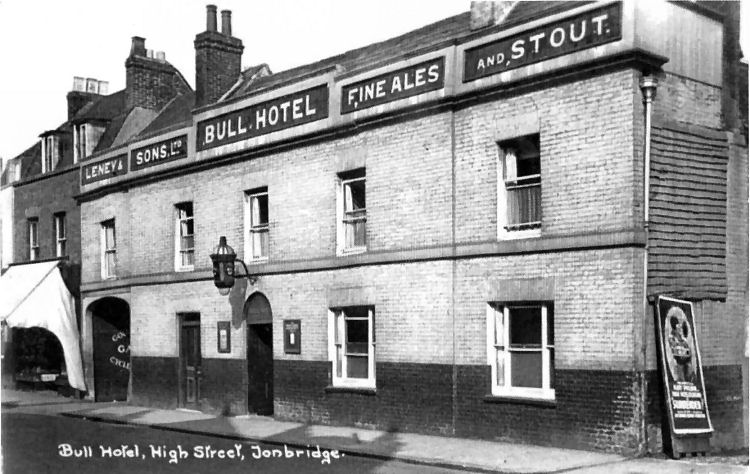
Above postcard, date unknown. |

Above photo, date unknown. Licensee W C Wilson.
By kind permission
http://tonbridgecollectables.com/index.php |
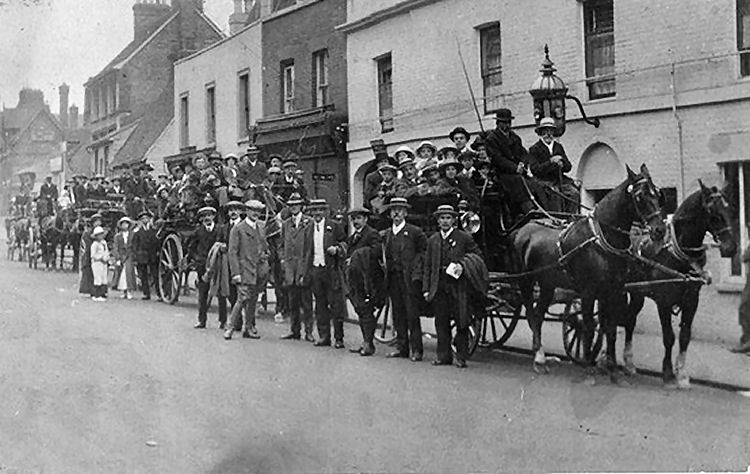
Above photo, showing the Roughway Mill workers in 1900. |
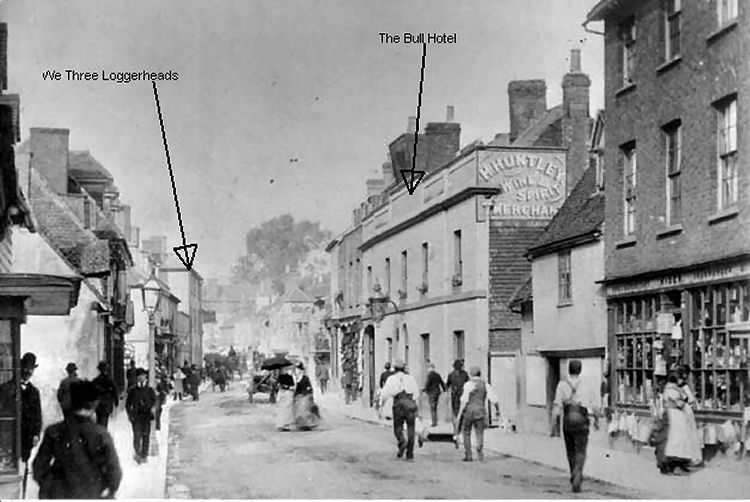
It is suggested by Nigel Humphries that the pub shown on the left could
well be the "We Three Loggerheads" which if so, is now the site occupied
by the "Humphrey
Bean."
By kind permission
http://tonbridgecollectables.com/index.php |
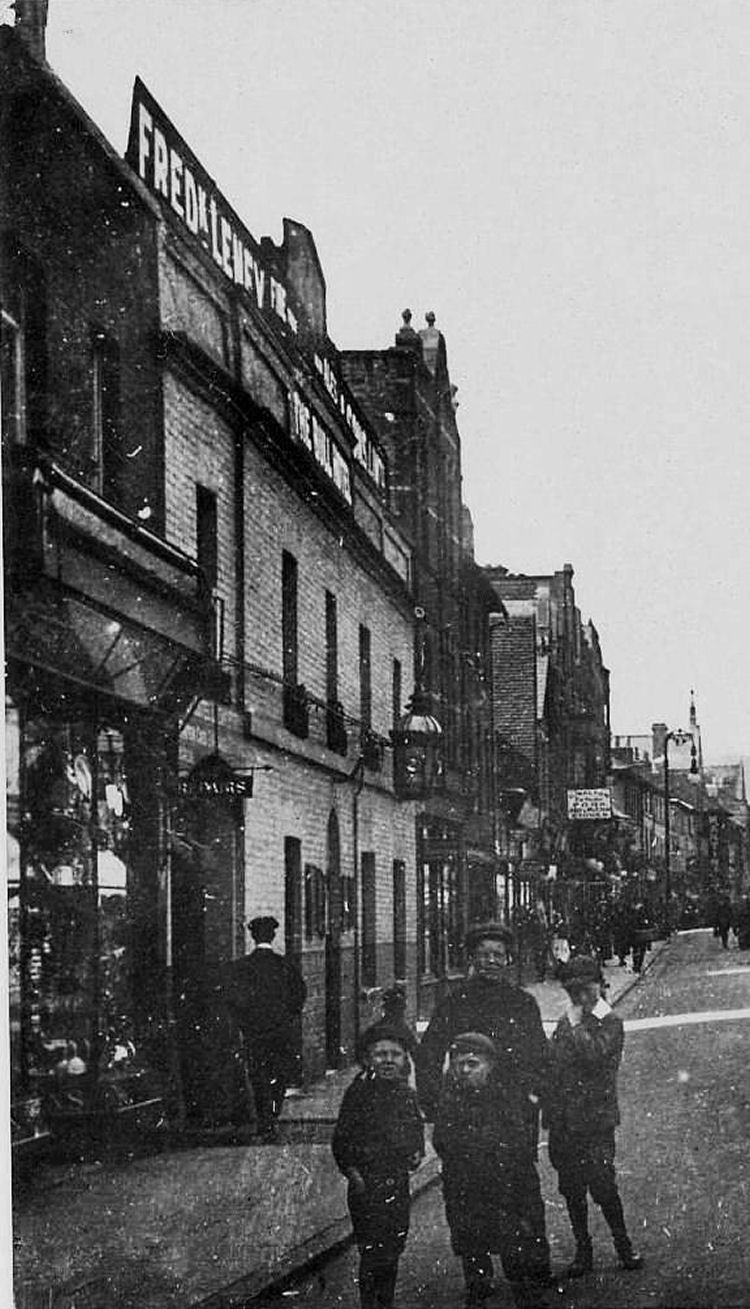
Above photo, date unknown.
By kind permission
http://tonbridgecollectables.com/index.php |
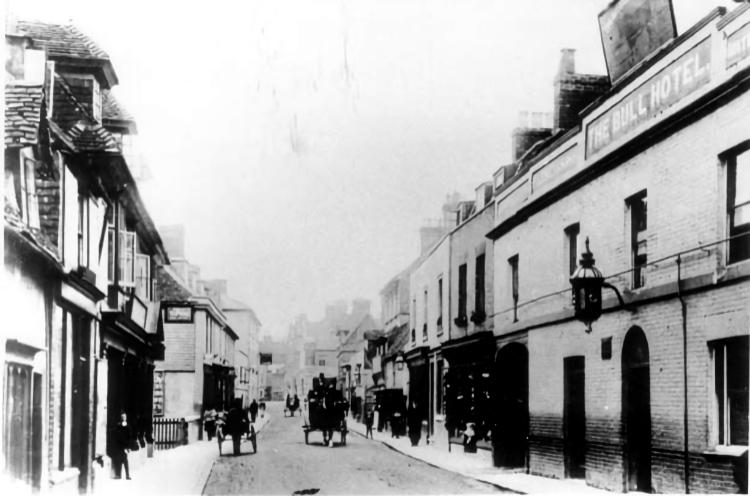
Above photo circa 1900. |

Above postcard, circa 1910. |
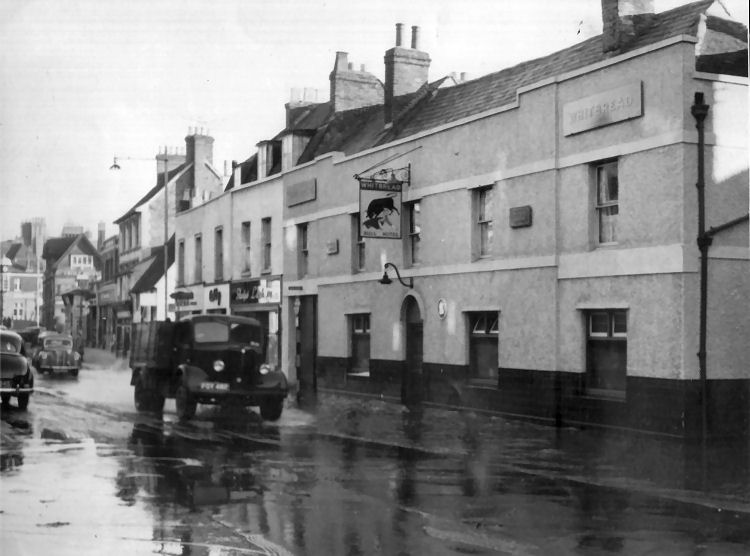
Above photo, circa 1944, kindly sent by Tim V. |

Above photo, date unknown. |
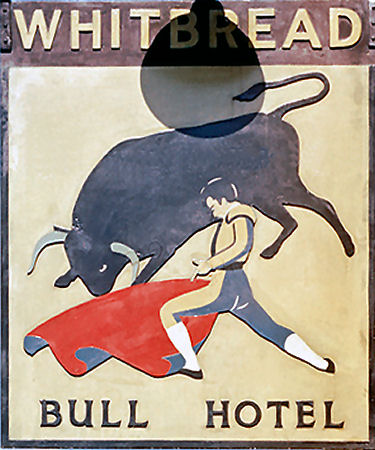
Above sign 1960s. |
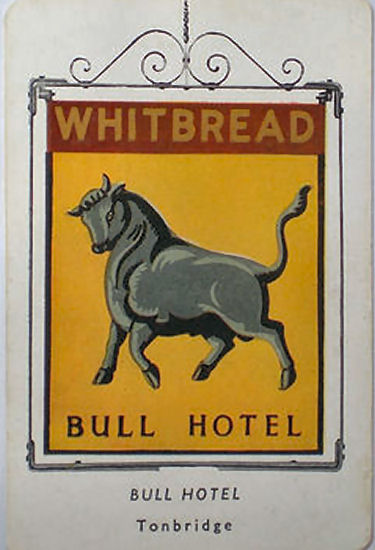 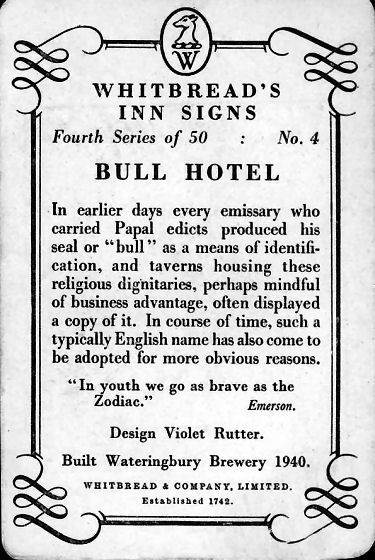
Above card issued March 1953. Sign series 4 number 4. |
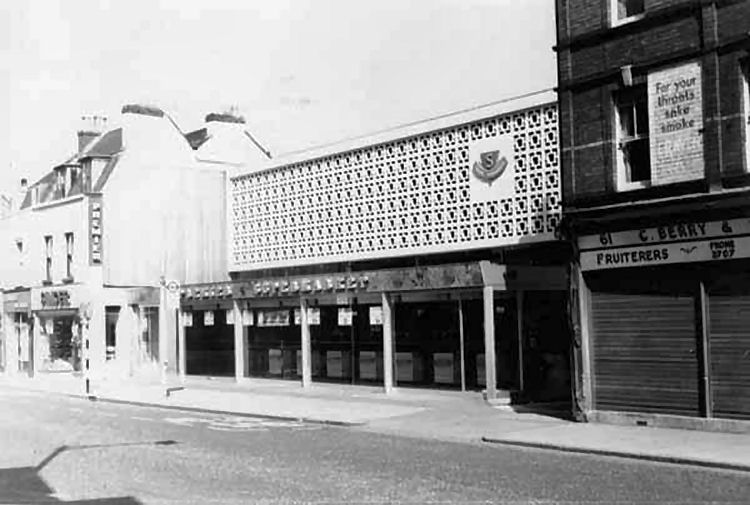
Above photo 20 June, 1964 when it was operating as Macfisheries food
centre. Kindly supplied by
http://www.tonbridgehistory.org.uk/ |
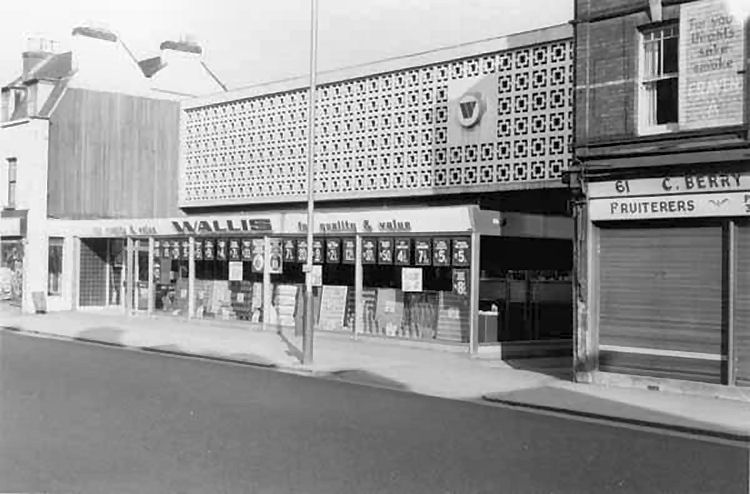
Above photo 19 March, 1972 as Wallis.
Kindly supplied by
http://www.tonbridgehistory.org.uk/ |
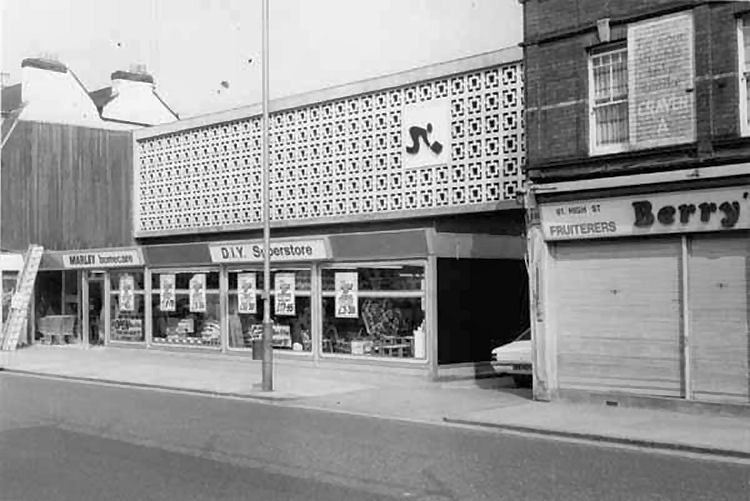
Above photo, date unknown, as DIY Superstore.
Kindly supplied by
http://www.tonbridgehistory.org.uk/ |
The proprietor W C Wilson advertised the premises as the headquarters of
the Rifle, Football. Harriers & Angling Clubs. Druids, Equitable, and
Gardeners' Societies. Catering for small parties. Good Stabling an Posting.
The licensees of the hotel were also wine and spirit merchants.
The pub used to stand in the middle of the High Street and Mike Arnold
says he can remember it there in the 1960s. However, it was demolished to
make way for Macfisheries wet fish which also have been demolished and
rebuilt.
|
Kentish Gazette, 19 March, 1783.
Some little time ago a man names Christpoher Baker, being at the
"Bull," at Tonbridge, and very much intoxicated, far so near the
fire as to scorch and burn himself in so shocking a manner that he
died in a few days after.
|
|
From the Kentish Gazette, 19 April 1842.
APPREHENSION OF GOOD, THE MURDERER, WORKING NEAR THE SOUTH-EASTERN RAILWAY.
This unhappy wretch was apprehended at Tonbridge on Saturday last. He
was working by the South-Eastern Railroad as a bricklayer’s
labourer.
Some money was found secreted in one of his boots, and a gold watch was
concealed on his person. A portion of a pair of stockings and an apron
covered with blood were made into a pad for his shoulder, and at his
lodgings was discovered the dress which he is described to have worn
when the horrible murder was discovered. He was conveyed to Maidstone
gaol on the same day.
FURTHER PARTICULARS.
On the night of Sunday se’nnight, about 11 o’clock, the individual
calling himself Connor, but supposed to be Good, came into the town of
Tonbridge in a fish van, and slept for the night at the "Bull"
public-house. On Monday he applied for work as a bricklayer’s labourer
to the foreman of Mr. Henry Barrett, a builder in Tonbridge, who is
erecting some cottages near to the South Eastern Railway. He said that
he had been working on the line, meaning the South Eastern Railway for
14 days. The foreman, being in want of hands, then took him on. From the
time of entering on his work, he appeared to shun and avoid
communication with his fellow-workmen, and if questions were asked by
them he returned a short and abrupt answer. He continued at his work
until the morning of last Saturday, when a man named Thomas Rose, who
had formerly been a constable of the V division of the metropolitan
police, and while so was stationed at Wandsworth, but who is now a
labouring man residing in Tonbridge, saw the man, and immediately
recognising him as the murderer Good, accosted him, and said, "Why you
are the man Good. Your name is Daniel Good." The man replied, "No, it is
not; my name is James Connor." Rose then said, "Why, you are he that I
have seen in Putney Park-lane; you was coachman to a gentleman there."
The man told him he was mistaken, he never had been a coachman, and was
quite unacquainted with any place called Putney Park-lane. But he did so
in so confused a manner as at once to convince Rose that he was no other
than Daniel Good, the murderer. Rose gave information to Mr. Humphrey,
the superintendent of police. That officer took him into custody, and
conveyed him to the watchhouse. He was taken before Mr. Hare, a resident
magistrate.
In reply to a question, the prisoner replied, firmly, that his name was
James Connor, that he had known no woman named Jane Jones, and that he
had not been guilty of any act of murder or violence.
The prisoner, upon his entering the Court, and being placed at the bar,
took from his pocket a comb, and with it turned back the hair from his
forehead, so as to hide (as that was, apparently, his object), a bald
place on his head. This circumstance was not unnoticed, and for this
reason, that in a description of Daniel Good issued by the Commissioners
of Police it was stated to be the practice of the murderer to do so.
Throughout the examination, which occupied upwards of two hours, the
prisoner maintained a firm and collected demeanour, until the witness
Rose was placed in the witness-box, when he instantly turned exceedingly
pale, and tremblingly endeavoured to avoid the gaze of the witness by
fixing his eyes steadfastly on the ground. In personal appearance he
fully answered the description already given of him in the Government
Police Gazette, &c. After Rose had given his evidence in chief, he said
he was confident that the prisoner was the murderer Good. His person was
well known to him, having seen him both night and day, and at all hours,
driving a phaeton and pair, and at times a single horse chaise. He had
on numerous occasions conversed with him, and asked him for a light when
at the stables in Putney Park-lane, and he was certain that the prisoner
was the same man.
The prisoner declined making any statement, and he was shortly
afterwards removed from the bar and conveyed, safely secured by two of
the Tonbridge officers, in a post chaise, to Maidstone gaol.
In the bundle, which the prisoner brought with him to Tonbridge, were
found the old drab frock coat, drab trousers, and gaiters, which were
stated to have been worn by Good when he escaped from the stables in
Putney Park-lane, on the night of the discovery of the murder. About the
prisoner’s person was found part of a woman’s calico apron, in one
corner of which there was a spot of blood. Also a silver hunting watch,
engine-turned, three sovereigns and a half, and three half-crowns.
The excitement occasioned throughout the town and neighbourhood of
Tonbridge during the afternoon and evening of Saturday, by the
apprehension in that distant locality from the scene of murder of a
criminal whose name will long be execrated, appeared to have much
increased on Sunday; persons of all classes flocking in during the day
from Tonbridge Wells and the adjacent villages, for the purpose of
learning the particulars, and to many the "Bull" public-house, the
residence of Mrs. Andrey, and erections at which the prisoner worked,
were objects of no small attraction.
On Saturday night Superintendent Malalieu, of the R division,
accompanied by a private constable of the V division of police, who was
perfectly acquainted with the person of the murderer, proceeded, by
order of the Commissioners of Police, in a post-chaise to Maidstone,
which town they reached about half-past three o’clock on Sunday
morning.
They immediately proceeded to the county gaol, and had an interview with
Mr. Bone, the governor, and at four o’clock, the prisoner, along with
two or three other of the inmates of the gaol, most resembling the
description of Good, were placed together in one cell, and nightcaps by
direction of the governor placed on their heads. The V police constable
was then introduced into the cell, and upon being required to point out
the man whom he suspected to be Daniel Good, instantly went up to the
prisoner, and said, "This is Daniel Good," and pulled off his nightcap.
Good hung down his head, and refused to answer any of the questions put
to him.
At eight o’clock on Sunday evening the suspected murderer, Daniel Good,
arrived in London from Maidstone Gaol, and was conveyed in a
hackney-coach to the station-house in Bow-street, where he remained to
await his examination, which was appointed to take place at the
Bow-street police court, before Mr. Hall, the chief magistrate, at 10
o'clock yesterday forenoon. Good, after having been formally charged
with the wilful murder of Jane Jones, otherwise Jane Good, was placed in
a cell, in which there was no other prisoner, and two policemen were
appointed to watch him, lest he should lay violent hands on himself.
On Saturday a man named Gammell, charged as an accessory, and the
prisoner's wife were taken into custody.
Standard Office, Monday Evening.
The examination commenced at Bow-street before Mr. Hall this morning. As
early as nine o’clock all the avenues to the office were crowded with
persons anxious to obtain a glimpse of the wretched miscreant. On the
doors being opened a tremendous rush was made, and the reporters were
unable to gain a situation in which to hear the proceedings. An appeal
was made to the magistrate by the reporter of the Standard on his own
behalf and those deputed to attend from other newspaper offices, but
without obtaining any redress. At length the chief clerk to the surprise
of the court, and we are sure it will be to the surprise of the whole
country, stated that only the reporters from the Times and Morning
Herald would be accommodated. The examination shortly afterwards
commenced, and was continued to the middle of the day, at which time our
correspondent left to forward our parcel.
The evidence was a repetition of the facts already before the public.
The prisoner was remanded until Thursday next, at ten o’clock.
|
|
Maidstone Journal and Kentish Advertiser, Tuesday 3 February 1863.
Tonbridge. A Dishonest Servant.
On Wednesday last a young woman named Rose Woolley, was placed before
Major Scoones on a charge of having stolen various articles, in the
house of Mr. Richard Montague, landlord of the "Bull Inn." The prisoner,
it seems, had been in Mr. Montague's employer about 3-months, and lately
several small articles had been missed. On Monday two of the
prosecutor's nieces missed their purses from dresses which had been hung
up in the bedroom the contents amounting to nearly £3 and the prisoner
was questioned on the subject. She said that she also had lost a watch,
and threw suspicion upon a person who had stayed at the house the
previous night.
Superintendent Dance, however, was called in, and prisoner was detected
in an attempt to conceal the watch which she alleged to have been
stolen. A further search resulted in the discovery of the two purses in
the furnace hole, and the girl then admitted the charge. She was
summoned for trial.
|
|
From the Southeastern Gazette, 5 June 1866.
Petty Sessions, Tuesday. (Before E. Cooper, Esq., in The chair, Major
Scoones, and H. X. Moore, C. Powell, and R. Rodger, Esqrs.)
The license of the “Bull Inn,” Tonbridge, was transferred from
Mr. Richard Montague to Mr. Charles Bailey.
|
|
From the Southeastern Gazette, 26 June 1866.
BULL HOTEL, HIGH STREET, TONBRIDGE.
CHARLES BAILEY begs to inform the nobility, gentry, and the public
generally, that he has succeeded to the business lately carried on by
Mr. R. Montague, and respectfully solicits the patronage of those who
have so many years favoured his predecessor; assuring all those who may
honour him with their commands, that he will always endeavour to merit
their confidence and support.
Licensed to Let Horses and Carriages.
LIST OF PRICES.
Fine Cordial Gin ..10s. 6d., 12s., and 13s. 6d. per gallon.
Fine Old Jamaica Rum 16s, 6d. per gallon.
Martell’s & Hennessy’s Cognac Brandy, A 1. 27s. Od. Per gallon.
Very fine Scotch Whisky. 18s. 0d, per gallon.
Good Port Wine 36s., 32s., 48s. per dozen.
Pale, Golden, and Brown Sherries, from 30s. to 60s. ditto.
All other Wines and Spirits of first quality at moderate prices.
Bottled Ales and Stout always in good condition. Soda Water, Lemonade,
and Ginger Beer.
Very fine Bitter Alee, Stout, Porter, and Mild Beer, on Draught.
A good Ordinary provided every Market Day at 1 and 2 o’clock, 2s, each.
All orders punctually executed.
Terms Cash.
|
|
Maidstone Telegraph, Saturday 11 September 1869.
Alleged assault at Tunbridge.
(Sic)
Stephen Smith and William Fowler, two respectable looking men were
charged with assaulting Eliza, wife of Joseph Cunningham, at Tunbridge,
on the 28th of August.
Defendants denied the charge. The witnesses on both sides were ordered
out of court.
Complainant, a young woman deposed:- I have lately come to Tunbridge for
the purpose of hopping. On Saturday week as I was going from Tunbridge,
I met my father and mother, and my husband had another man, had
something to drink at the "Bull." I only drank about two glasses of ale
all day. We went home to Prince Style Farm, where we were working and on
the way my husband laid down in a field, where defendants and three
other men were working. Smith came up, and asked what my husband was
doing there, and he said "nothing." Smith told him to be off, and I and
my husband started from the field, but Smith did not give my husband
time, and knocked him down and hit me on the back. He then knocked my
husband into the ditch; and came and dragged me by my clothes into the
ditch, and did not leave a bit of clothes on me. (Complaining produced
wearing apparel torn to pieces.) Fowler came up with a horse and cart
into the lane and struck me and my husband. He kicked me on the side,
and knocked my husband down. It was not a fit thing for married men to
tear all the clothes off a woman, but very indecent. Nothing fast
between us before. Another man struck us, but I did not know him. They
swore it at us very much.
Cross-examined by Smith:- You only spoke to my
husband. I was sitting down when you came along, and my husband was
standing up.
Complainant:- Fowler gave the wrong name when my father followed him.
John Towner stated:- I came down here hopping and on Saturday 28th of
August, saw complainant and her husband in Mrs. Humphry's Beerhouse.
When we left I walked with them a little distance, and then left them.
About an hour after complainant came back and said she and her husband
had been badly beaten. I went back with her, and found a skirt and apron
in the lane leading to Prince Style's Farm. All her clothes were badly
torn. We returned to the Beerhouse, and Mrs. Humphrey told us defendants
had called and had a pot of beer, and it said they had had a row in the
lane.
Complainant's father disposed to his daughter telling him of the
assault, and that the carter, Fowler, gave the name of Neale.
Defendant Fowler said he was waggoner to Mr. Lambert and on the day in
question he was called by a boy, who said his master had been struck by
Mr. Cunningham. Complainant flew at defendant, following him up the town
as far as the grammar school. He was afraid of having stones thrown at
his head.
Smith, in his defence stated he was bailiff to Mr. Lambert. He saw the
man and woman sitting under the hedge in the field and as he was going
to lock the gate, he asked them to come out. The man used foul language,
and I ordered him out, but did not insult the woman or strike her.
Edward Haffenden:- I am a labourer and work for Mr. Lambert. Mr. Smith
ordered complainants and her husband out of the field belonging to my
master. They refused to leave, and the man was saucy, and got up and
struck Smith, knocking him to the ground with the first blow. The man
and woman hit him when he was on the ground. Another man, a labourer
pulled them off Smith, who then pushed them out of the field. Cunningham
and Smith had a struggle, and both went into the ditch together, I did
not see any clothes torn. The woman then came out to help her husband
Fowler struck complainant and her husband, when he pulled them from
Smith. I saw the woman with torn clothes in a hand, but did not
interfere at all.
Cross-examine:- Smith did not strike complainant's husband first.
John Hazelden, another labourer in the employ of Mr. Lambert said he
should not know complainant or her husband, as it was nearly dark when
he saw them. Cunningham did not knock Smith down, but struck him. They
tussled and both fell, and in the struggle that woman got pushed in the
hedge. Complainant shouted "murder," and I cried out that she was dead
(laughter). Fowler pulled Smith and Cunningham out of the ditch, and
threw complainant and her husband into the road. Witness did not see any
one strike the woman, and saw no clothes torn, but saw them after they
were torn.
The Bench consulted, and the Chairman said there appeared to have been a
little squabble, but not sufficient to justify conviction, therefore the
summons would be dismissed.
Mr. Lambert informed the Bench that Smith had been in his employ 10 or
11 years, that was the last man to commit the offence of which he had
been charged. Fowler had been with him 5 years, and both men were very
inoffensive and had the best of character.
|
|
From the Kent and Sussex Courier. 12 September 1873. Price 1d.
EXTRA HOUR GRANTED.
Mr. J. Payne, landlord of the "Bull Hotel," applied for and was granted
an extra hour on the occasion of the annual dinner of the Tonbridge
Cricket Club.
|
|
From the Kent and Sussex Courier, 31 July 1874.
Tonbridge Suicide.
On Tuesday afternoon, and inquest was held at the "Bull Inn," before J.
N. Dudlow, Esq., on the body of John Collisston, who hung himself to a
bedpost on the previous Sunday morning.
Robert Jones said he and deceased lodged at the German lodging house,
and on Sunday morning, hearing the deputy rushed downstairs saying that
a man had hung himself, he went upstairs and cut him down. He was
hanging by a cord to the bedpost, with his feet on the ground under the
bed. On the previous afternoon the deceased who complained of his feet
being bad, had said he would not be on them much longer.
Jane Taremer, the deputy, said deceased come to lodge at the house on
Friday night, and she found him hanging to the bedpost, on the Sunday
morning.
James Tyler, a labourer, who slept in the same room as the deceased, but
in another bed, said that at 5 o'clock, the deceased spoke to him and
said he had not slept an hour all night, as his feet were so bad.
Edmunds James Wingfield, of Gravesend, a wheelwright, identified the
deceased as being his wife's uncle, and an engine driver. He was 55
years of age, and up to within last month had lodged with witness. In
November last he lost his wife. He had worked at a brewery for 25 or 26
years, but left last Easter, and since then had not been able to get a
situation. The deceased had been strange for some time past.
Daniel Collisston identified the deceased as his brother, and
Superintendent Dance produced a letter, in which deceased said he felt
nearly mad sometimes, and might not be in the world long.
The Jury returned a verdict that the deceased hung himself, being at the
time in an unsound state of mind.
|
|
Kent & Sussex Courier 11th December 1889.
Tonbridge Petty Sessions. Licensing.
An hours extension was granted to Mr Herbert Huntley, of the "Bull Hotel,"
for a special installation and programme night of the "Argyle" Lodge of
Druids. |
|
Sussex Agricultural Express, Saturday 06 September 1902.
SAD END OF A COMMERCIAL TRAVELLER.
The folly of partaking of a hearty supper within a short time of
retiring to rest was illustrated at Tonbridge on Monday evening when an
inquest was held at the Mortuary by Mr, Coroner T. Buss, on the body of
William Bunce, a commercial traveller, who was discovered dead in bed at
the "Bull Hotel "where he had been staying. The deceased's home was over
the premises of Mr. E. Pelton, of The Pantiles, Tunbridge Wells.
Mr. C. T. Oliver was chosen foreman of the jury, and Detective Everett
and Corporal Peacock were present on behalf of the police.
The first witness called was William Frederick West, of Chiswick,
London, brother-in-law of the deceased, who identified the body, and
stated that Bunce was 53 years of age, and had a wife but no children.
His widow was unable to be present that day. Witness last saw the
deceased alive a week ago, when he appeared to be in his usual good
health. As far as he knew the deceased had nothing to depress him, and
his financial affairs, to the best of his knowledge, were all right. He
was not aware that he was in the habit of taking anything to soothe his
nerven. He was of a very cheerful disposition.
May McCune, barmaid at the "Bull Hotel," said she had known the deceased
for fifteen months. He was in the habit of going to the house every
Tuesday. He went there last Tuesday, and returned on the Thursday, when
he appeared to be in his usual cheerful spirits. He slept there that
night, and on the following morning left for Paddock Wood, and returned
to dinner, and after having supper went to bed between 11.30 and 11.45.
Before leaving witness he asked her to procure a collar for him in the
morning and to call him at 9.30.
The Coroner:— Was that later than usual?
Witness:— No, sir.
She went to his door at that time to tell him she could not get the
collar he wanted. She knocked, but got no answer. She did so again, but
getting no reply, she went inside, and found him lying on the bed fully
dressed and dead. He was quite cold.
The Coroner:— Was he strange in any way the previous night?
Witness:— Not at all. He complained of having neuralgia, but that was
all.
Detective Everett said about ten o'clock be was called to the "Bull
Hotel," where he found the deceased perfectly cold and stiff. The
deceased smelt rather strongly of chlorodyne, and his left hand was over
his Heart. Nothing on his person gave any clue as to the cause of death.
An empty revolver and some loose cartridges were in his bag, together
with an empty bottle which had contained chlorodyne. Witness removed the
body to the mortuary, and had since made inquiries, and found deceased
to be a man of very sober habits, and was very much respected in the
town.
The Coroner:— Had he the appearance of having used the chlorodyne
recently?
Witness:— Only that he smelt of it, sir. I came to the conclusion that
he took a dose to ease the pain of the neuralgia, and that it had
overcome him from the position he was in.
A juryman:— The fact that he had asked for the collar to be sent for
showed that he expected to get up in the morning.
The Foreman:— A man sometimes lies down before getting into bed.
Witness:— He had fallen, sir.
Dr. H. J. Manning Watts spoke to making a post mortem examination.
Externally there were no marks of violence. He was a stout and heavy
built man. The heart was fat, and the stomach was overloaded with food
and distended. Here there was also a faint smell of chlorodyne. The
deceased had evidently partaken of a hearty meal before retiring to bed,
and the digestive organs had not been able to act. He attributed death
to overloading of the stomach, and this, noting upon the heart, caused
syncope.
The Coroner:— Do you consider chlorodyne had anything to do with the
cause of death?
Witness:— I should say not.
Is it taken for neuralgia?
Yes, very often.
The Coroner having summed up, the jury returned a verdict in accordance
with the medical evidence.
|
From
http://tonbridgecollectables.com/page31.php
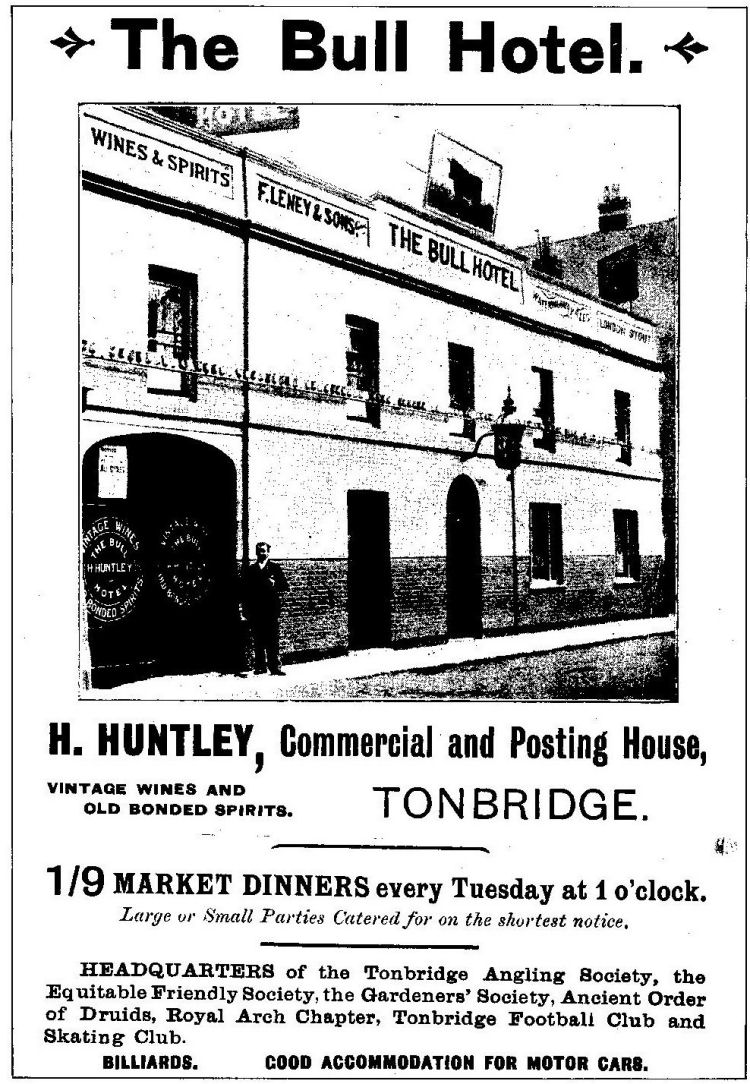
Above image showing an advert for the hotel, 1900. Showing licensee
Herbert Huntley outside the pub. |
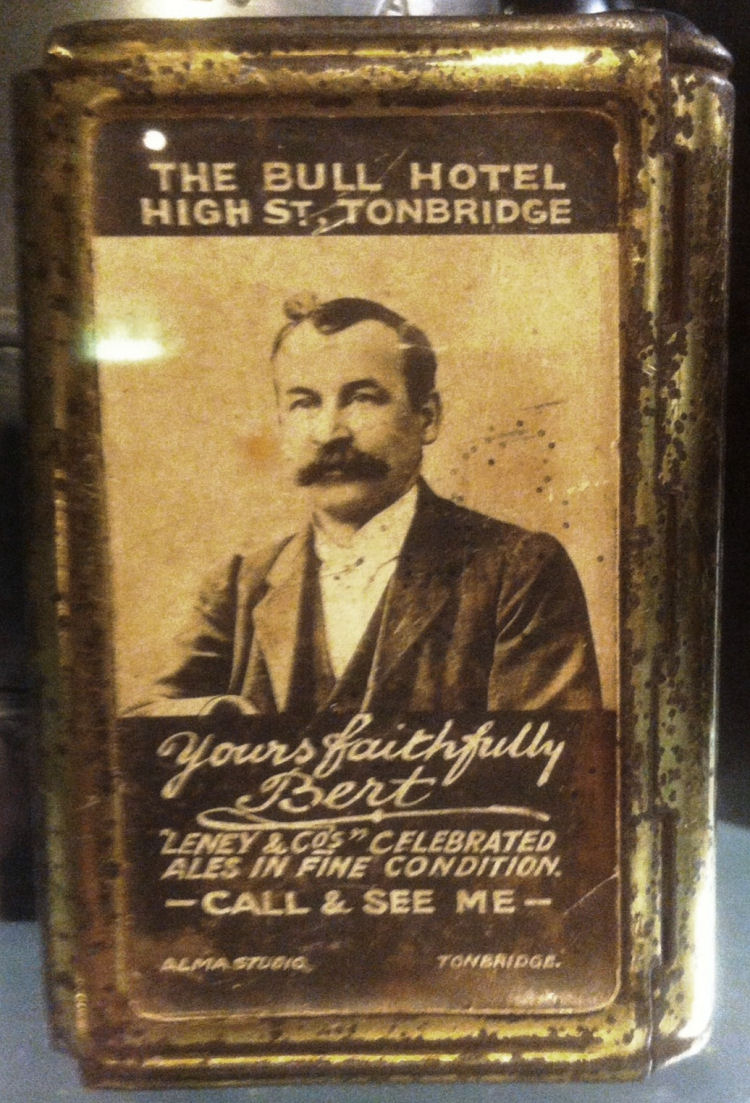
Above photo showing a snuff box showing Herbert Huntley circa 1889. |
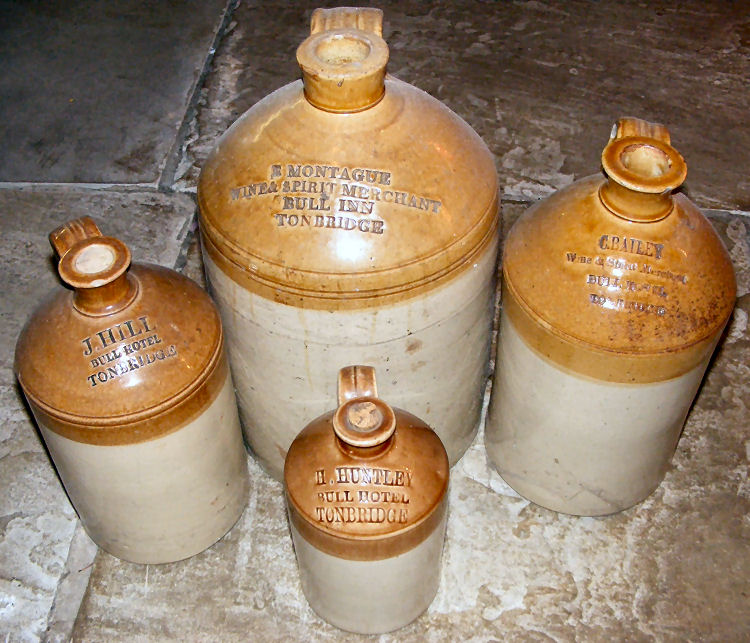
The proprietors of the "Bull Hotel" were also wine and spirit merchants
and shown above are some of the flagons used. |
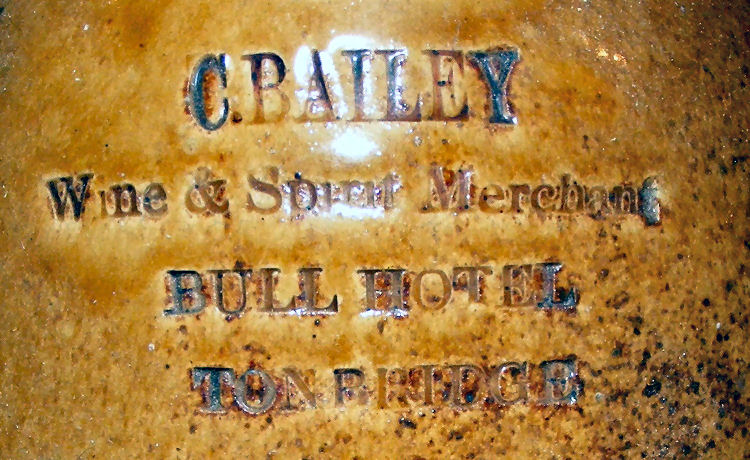
Above photo showing the writing on a flagon circa 1876. |
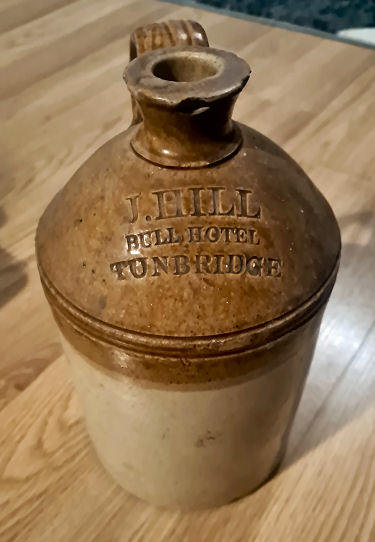 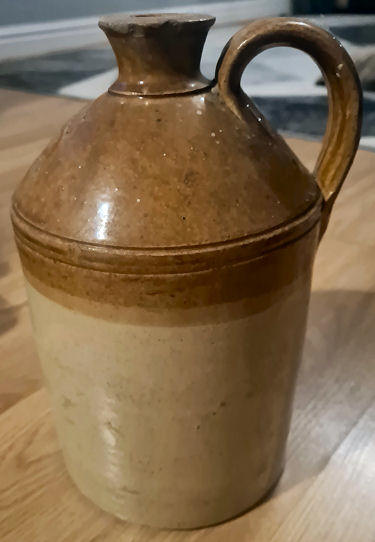
Above flagons circa 1878, kindly sent by Cassi. |
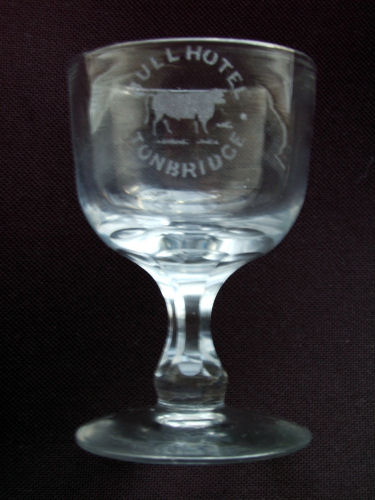
Above photo showing a drinking glass, date unknown. |
LICENSEE LIST
BARTON Henry 1828+

MONTAGUE William 1832-40+

MONTAGUE Richard 1841-June/66 (age 42 in 1861 ) )
BAILEY Charles June/1866-71+ (age 34 in 1871 ) )
PAYNE Joseph Spencer (also boot and shoemaker) 1873+
PAYNE Joseph Spencer
 & Charles
to 10/Aug/1874 & Charles
to 10/Aug/1874
HILL John 10/Aug/1875-78+
WILSON W C ????
HUNTLEY Herbert 1880-1901+ (age 45 in 1901 ) )
TOMLIN A E 1910+
 OUTTEN Major James Henry 1918
OUTTEN Major James Henry 1918

 GREGORY Mr & Mrs 1/July/1919+
GREGORY Mr & Mrs 1/July/1919+

VAUGHAN Herbert Cecil 1920s-38+
VAUGHAN Herbert Cecil "Tom" (son) 1943+

https://pubwiki.co.uk/BullHotel.shtml
http://www.closedpubs.co.uk/bullhotel.html
 From the Pigot's Directory 1828-29 From the Pigot's Directory 1828-29
 From the Pigot's Directory 1832-33-34 From the Pigot's Directory 1832-33-34
 Census Census
 Sevenoaks Chronicle and Kentish Advertiser Sevenoaks Chronicle and Kentish Advertiser
|





















